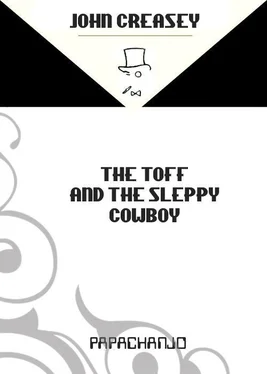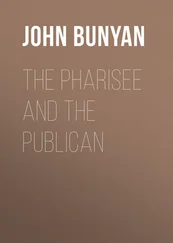John Creasey - The Toff and The Sleepy Cowboy
Здесь есть возможность читать онлайн «John Creasey - The Toff and The Sleepy Cowboy» весь текст электронной книги совершенно бесплатно (целиком полную версию без сокращений). В некоторых случаях можно слушать аудио, скачать через торрент в формате fb2 и присутствует краткое содержание. Жанр: Старинная литература, на русском языке. Описание произведения, (предисловие) а так же отзывы посетителей доступны на портале библиотеки ЛибКат.
- Название:The Toff and The Sleepy Cowboy
- Автор:
- Жанр:
- Год:неизвестен
- ISBN:нет данных
- Рейтинг книги:5 / 5. Голосов: 1
-
Избранное:Добавить в избранное
- Отзывы:
-
Ваша оценка:
- 100
- 1
- 2
- 3
- 4
- 5
The Toff and The Sleepy Cowboy: краткое содержание, описание и аннотация
Предлагаем к чтению аннотацию, описание, краткое содержание или предисловие (зависит от того, что написал сам автор книги «The Toff and The Sleepy Cowboy»). Если вы не нашли необходимую информацию о книге — напишите в комментариях, мы постараемся отыскать её.
The Toff and The Sleepy Cowboy — читать онлайн бесплатно полную книгу (весь текст) целиком
Ниже представлен текст книги, разбитый по страницам. Система сохранения места последней прочитанной страницы, позволяет с удобством читать онлайн бесплатно книгу «The Toff and The Sleepy Cowboy», без необходимости каждый раз заново искать на чём Вы остановились. Поставьте закладку, и сможете в любой момент перейти на страницу, на которой закончили чтение.
Интервал:
Закладка:
Exactly what happened, Rollison could not tell. Some kind of muscular contortion appeared to take place in the tall man’s midriff, his chest heaved, and he gave a gasping sound, something between a yawn and a groan; this was emitted through his mouth, which closed again im-mediately.
“You see,” said Jones, in triumph.
“How often has he done this?”
“Six times, now,” the small man answered precisely.
“I should say he’s coming round,” Paterson suggested, and turned to Rollison. “Wouldn’t you say so?”
“It could be,” replied Rollison non-commitally.
“Have you ever seen him before?” asked Paterson.
That was his key question, of course, and the one which Grice wanted answered, and the answer was easy to give. Yet Rollison did not immediately give it. He went closer to the bed, and placed a thumb on the man’s left eyelid, raising it. The eye was hazel coloured, the pupil small but not a pin point size. Rollison turned back and said:
“No, I have never seen him before any time anywhere.”
“Why did you have to look into his eyes, to find out?”
“I didn’t,” said Rollison. “I looked into his eye to see whether he was conscious. I don’t think he is or he would have started when I first touched it and the eyelid would have flickered. But I doubt if he’ll be unconscious for long, now. What did he have with him?”
“Passport, a few coins and small change, some keys and his ticket copy with some baggage receipts clipped on and having your name and address as his address in England,” stated Paterson. “Either his luggage was left behind in Tucson, Arizona, or it was stolen, for he didn’t have any when he reached New York.”
“Oh,” said Rollison blankly.
Then a youthful Pakistani doctor came in, was pleasant, examined the patient, assured them that he would come round within an hour, and ushered all of them out, except Jones. It was a very convincing exertion of authority and could cause offence to no one. The nurse pulled the bedclothes down farther over the big feet, but did not even make a pretence of tucking them in. Rollison and Paterson walked past the guard and out to the guards at the front of the small building.
“Have you noticed anything at all suspicious?” asked Paterson.
“No, sir. And we are in regular walkie-talkie contact with the men on either side.”
“Don’t let anyone on a motor-cycle go in, whatever his credentials,” warned Paterson, and then added to Rollison : “His clothes, shoes and everything he had with him are in my office. Fingerprints and Photography will have finished with them by now. Would you care to look at them before I send them to the hospital?”
“Very much,” Rollison said.
A few minutes afterwards he was looking at a well-made suit in a sandy-colour, a large-brimmed hat with a curly brim of a darker colour, more brown than sandy, and cowboy boots of the same colour as the hat, beautifully made in a patterned leather. The heels were a different shape from ordinary walking shoes, and the tops were wide and trimmed with darker leather. They had a new look, but were obviously broken in; the leather was soft and pliable. Next to these were a checked shirt with piping at the collar and the two breast pockets, a tie which was like a leather shoelace threaded through what looked like a cow’s face in copper and with a turquoise blue filigree ring. The other oddments were impersonal, even to a pack of paper handkerchiefs.
“No socks?” asked Rollison.
“They must have left them at the hospital,” Paterson said. “Do you know —” he broke off, as if embarrassed, but when Rollison did not push him to go on, he said:
“This is the first murder attempt I’ve come across at the airport.”
“I wish I knew the motive,” Rollison sighed. Paterson’s eyes widened. He had very fair hair and fair skin, and his face was full of freckles.
“Surely that’s obvious.”
“Tell me, then,” begged Rollison.
“To prevent you from seeing him!”
“Oh,” said Rollison, startled. “Yes. Yes, possibly.”
All the time he had been expecting Paterson to ask questions about the girl who had been with him, but the policeman still did not mention her. The motor-cyclist’s attack could have been on her, not on the Toff, but if Jack Fisher had forgotten to mention Pamela Brown then Paterson probably did not know she had been in the car with him. Paterson looked at him curiously and said:
“I would have thought you’d realise that.”
“No one wants to believe he’s a target for murder,” Rollison murmured. “What are you planning to do with Thomas G.?”
“Loman? I’m blessed if I know.”
“He did have my address,” Rollison mused. “And in view of all that’s happened, I’d better take him in. Can you send me an escort car?”
“Grice may have something to say about where he goes,” demurred Paterson. “He’s sending two men, remember?”
“I remember,” Rollison said. “I think you’ll find they would like to have me in the West End together with Loman, so that they can keep an eye on our comings and goings. I wonder if you can check on my car?”
His Bristol was battered, it proved, but washed and serviceable.
An hour later, Thomas G. Loman was conscious, and in two hours, the Pakistani doctor said it was all right for him to travel. All Loman could tell the police, it seemed, was that he had fallen asleep in his seat and remembered nothing until he had come round in the hospital.
He still looked dazed.
Meanwhile, Grice’s men, a detective sergeant and a detective officer whom Rollison did not know even by sight, had come to take over from Paterson’s officers. They were obviously more pleased than sorry that they could go back to London at once. The only piece of information they could give Rollison was negative: there was no trace of the motor-cyclist.
No one else seemed to be aware of the existence of Pamela Brown.
It was half past twelve when Thomas G. Loman, fully dressed, almost unbelievably tall, came out of the hospital, with the nurse by his side. She barely reached his shoulder. Paterson and his men as well as the two men from the Yard were watching, obviously intent on finding out if Loman showed any sign of recognition.
Rollison, standing by the side of his car, said: “I’m Richard Rollison.”
The other hesitated; this puzzled Rollison, who thought there was a question in his mind; but he did not put it into words.
“Shall we go?” Rollison suggested.
“Sure.” Loman immediately moved towards the driving wheel, but then drew back, gaping. “The wheel’s on the wrong side!”
“We do things that way in England,” Rollison explained.
“England? Oh — of course.” In a few long strides the American went to the other side, opened the door and climbed in; he showed the tall man’s care in bending his knees and stretching his legs. He put them out at full length and looked round in astonishment. “There’s good room,” he said. “Is that the way you do things in England, too?”
“Only when a car is custom-built,” said Rollison. “Gee!” breathed Thomas G. Loman.
He appeared then to surrender himself wholly to the joy of the car; its upholstery, its comfort, its instruments, its smooth starting, its easy riding. He leaned back in his seat and half closed his eyes and appeared to be ecstatic. Then he sat up and bumped his head.
“Oh!”
“And that’s the way we do things in England,” Rollison said. “Be careful.”
“I certainly will,” promised his passenger.
He began to look about him as if for the first time. He stared at cars and stared at people, at houses and the shops. Now and again he rubbed his long fingers together; he could make a cracking sound with his knuckles. Rollison did not try to make him talk yet; he was bound to ask questions before long, and information would probably come easier that way.
Читать дальшеИнтервал:
Закладка:
Похожие книги на «The Toff and The Sleepy Cowboy»
Представляем Вашему вниманию похожие книги на «The Toff and The Sleepy Cowboy» списком для выбора. Мы отобрали схожую по названию и смыслу литературу в надежде предоставить читателям больше вариантов отыскать новые, интересные, ещё непрочитанные произведения.
Обсуждение, отзывы о книге «The Toff and The Sleepy Cowboy» и просто собственные мнения читателей. Оставьте ваши комментарии, напишите, что Вы думаете о произведении, его смысле или главных героях. Укажите что конкретно понравилось, а что нет, и почему Вы так считаете.












